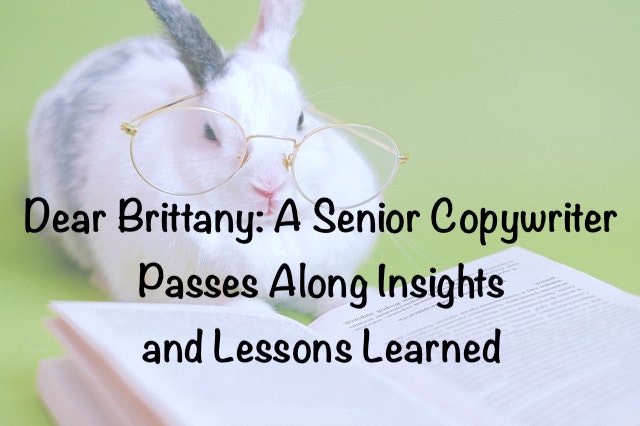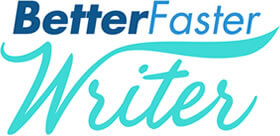My reasons for retiring from freelance copywriting were many, but doing so also gave me an unexpected benefit: being a resource for newbie junior copywriters.
Since setting aside my freelance hat to focus on farm, family and Betterfasterwriter.com, I’ve been approached by junior copywriters seeking advice. And I loooove being able to pass along wisdom that I learned the hard way, to make the lives of others just a tad easier and to know I have some kind of legacy to show for my 20 years of experience.
My most recent exchange with a junior copywriter came about via LinkedIn, as the delightful Brittany Snow reached out for a connection and sought my input. She sent me a list of questions and I answered them at length because I was on a train with plenty of time to think and write.
In order to pass along advice to other brave souls venturing into the freelance copywriting world, I have copied and pasted the letter below. Warning: It does get personal! This was written from the heart, to give insight into why I made the decisions I made.
And here is my letter to Brittany, with her questions in bold…
Dear Brittany,
Thank you for this opportunity! And kudos to you for wanting to learn from an oldie. When I started in 2000, we didn’t have social media, email marketing or digital marketing. Most copywriting was for print materials and websites. And my focus was on longer form content like whitepapers, case studies, documents for technical marketing, etc. because most of my business was in the tech space. The other big parts of my business were web content and printed materials like brochures. I wrote so many brochures! I did write the occasional ad, even banner ads when they started. And then when blogging became a form of marketing, I started ghost blogging. When content marketing became a “thing” around 2008, I laughed because it was what I had already been doing, but now it had a fancy name. As email marketing got more popular, I started doing a lot of email copywriting too. But I didn’t ever do social media marketing. I didn’t want to.
All that is to give you some context as I answer these questions since the types of copy you write in 2022 probably look very different from what I worked on in the early days.
What’s one thing you learned as a senior copywriter that you wish you’d known as a junior copywriter?
One thing I wish I’d known back when I was starting out… That I wasn’t as good a writer as I thought I was. I once did a content audit of over 600 blog posts I’d written for a client company over 10+ years. I wanted to weed out anything no longer relevant like notices about webinars. I was shocked to discover that 10 years earlier my writing was what I now consider subpar. It was humbling at first. But then later it was comforting as I realized I had dramatically improved, not stayed stagnant. I had grown.
Experience counts. That’s why I get frustrated when newbie copywriters charge too much money. At my peak, prior to the 2008 recession, I was charging $120/hour. Younger less experienced copywriters thought that meant they could too, instead of realizing that I had earned that rate through years of experience. Plus all those years made me faster, so I could get the same job done in less time.
One thing I wish I’d known back when I was starting out… That I wasn’t as good a writer as I thought I was.
What are the most valuable skills you gained as a copywriter?
I was a freelance copywriter because I was a single mom who needed the flexibility of self-employment and being able to work from home. It happened to be something I was good at. I was lucky, so lucky. That makes time management and the ability to prioritize tasks the most valuable skills I learned. But my writing continued to improve with every passing year, if that counts. I also had an innate ability to see the big picture when clients couldn’t. I don’t think that’s a skill I gained but it’s one I realized I had.
How did your journey as a copywriter begin?
I have a master’s degree in art history. I wanted to be a museum curator. But life took a different turn. I had an acquaintance who worked in marketing who suggested copywriting. I’d never heard of it. At the time, I was working as a copyeditor for Microsoft Press—copyediting turned out to be something else I had a knack for because I didn’t have any training in it but I was good at it. But I was miserable and needed to be at home with my kids. So when I started We Know Words, I did it as a business writer and editor, not a copywriter. However, it turned out I did know something about marketing because I had started an art and antiques magazine while in graduate school, and someone taught me about marketing to help me sell the magazine. Eventually it clicked and I realized what I had learned about marketing my magazine and what I had learned about persuasive writing in graduate school fit together and voila! I knew what I was doing after all!
I realized what I had learned about marketing my magazine and what I had learned about persuasive writing in graduate school fit together and voila! I knew what I was doing after all!
What is the most challenging aspect of being a copywriter?
Getting clients. Getting clients. Getting clients. I had one client for 14 years. I felt like I was part of the team. I was with them for longer than some of the employees. I was sometimes training employees! But that was a rare blessing. Other times I’d think I’d landed a long-term client and then the company would go through a restructure and all of a sudden my contact was in a different role…or at a different company. Or new leadership would come in with their own freelance team. So many times I’d think a job was a certainty only to be disappointed.
I read once early on in my career that of all the hours you work, only half will be billable. I found that to be true. And that means no matter how busy you are, you have to be marketing all the time. For me, in-person networking was the best way to get clients because I truly love people and I’d make connections and stay in touch and people would pass my name along or hand over my business card, even years later. Do people even use business cards anymore?
When I moved away from the city and to the country, I no longer attended in-person events and I don’t like social media, so all that networking stopped. I had enough momentum to keep me going through word of mouth, thank goodness, but it was harder to find clients.
Of all the hours you work, only half will be billable.
Are there any books or resources that you recommend I read?
Learn about marketing. Your skill as a writer will continue to improve as you write, but you must understand the psychological aspects of marketing too. You must understand principles like people shop with their minds but buy with their hearts.
People like Seth Godin are geniuses. His book Purple Cow was a game changer for me way back when it came out. I used examples from that book countless times in meetings. Find the geniuses and learn from them…not the copywriting geniuses. They can teach you tricks. But the marketing geniuses can teach you marketing, and that’s the skill you really need.
When you know about marketing and you are working with marketing folks, you will have valuable input that can increase your value in their eyes (and that can translate to monetary value). Plus you will write better, more effective copy. And you’ll know which questions to ask. When I would ask clients what they were really selling, a mattress or a good night’s sleep, I would sometimes change their whole thinking about their approach.
The marketing geniuses can teach you marketing, and that’s the skill you really need.
What practices can you recommend I implement to strengthen my copy daily?
 Read and read and read. Read the cereal box and the gin bottle. Read articles and blog posts. Read all kinds of books, fiction and nonfiction. Listen to audiobooks. Reading improves writing. I recently bought a book for my grown daughter that I had loved when I read it years ago. She tried to read it but didn’t like it. Surprised, I decided I would re-read it. I didn’t like it. Twenty years of writing for a living had made me a better writer but also a more discerning reader, which in turn makes me a better writer.
Read and read and read. Read the cereal box and the gin bottle. Read articles and blog posts. Read all kinds of books, fiction and nonfiction. Listen to audiobooks. Reading improves writing. I recently bought a book for my grown daughter that I had loved when I read it years ago. She tried to read it but didn’t like it. Surprised, I decided I would re-read it. I didn’t like it. Twenty years of writing for a living had made me a better writer but also a more discerning reader, which in turn makes me a better writer.
Also hold yourself to a higher standard. I see what junior copywriters are posting on LinkedIn and I cringe. I come across a website or ad and I cringe. Just because others are getting a little sloppy does not make that okay. It’s like going to an event and not being sure what to wear: My advice is to dress just a notch above what you assume the attire should be, to be on the safe side. Apply that same advice to copywriting: Even if your client thinks it’s “good enough,” you be the one to take it to the next level. Give it one more read through and refine it one more time. Build time into your schedule so you can look at it with fresh eyes…always build that padding into your schedule, with every project. Train yourself to be a good editor and proofreader, because good writing comes from good editing.
Hold yourself to a higher standard. Even if your client thinks it’s “good enough,” you be the one to take it to the next level.
Warmly,
Sharon
Photo by Anna Shvets from Pexels

